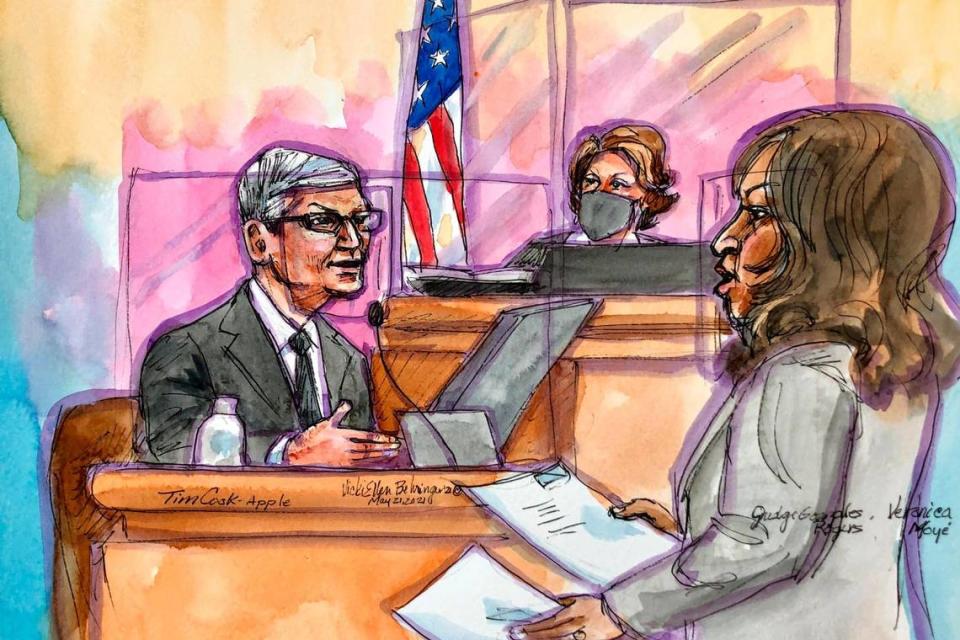Epic Games, creator of Fortnite, asks Supreme Court to hear antitrust case against Apple
Over the summer, Apple said it would petition the U.S. Supreme Court to hear its case against Epic Games, the Cary-based developer of the popular title Fortnite.
This week, the Triangle company actually asked first.
On Wednesday, Epic filed a petition for a write of certiorari to the Supreme Court, arguing the 9th Circuit Court of Appeals had incorrectly adjudicated aspects of the case.
Most petitions don’t get picked up; the Supreme Court typically hears 100 to 150 of the more than 7,000 appeals it receives in a given year. Yet this case could be the exception. It involves two prominent companies and affects how apps are downloaded — and how much they cost — for both iPhone and non-iPhone users.
“Epic versus Apple is what I’ve previously called the Super Bowl of antitrust,” Florian Ederer, a professor of economics at Boston University, said in October.
The legal battle began in August 2020, when Epic introduced an alternative way for iPhone and Android users to buy “v-bucks,” the in-game currency of Fortnite, the candy-colored battle royale game played by millions worldwide.
At that time, iPhone and Android users had to purchase v-bucks through Apple’s and Google’s payment systems, both of which took 30% of the revenue generated by app developers. (Apple and Google have since lowered their fees to 15% for certain developers.)
Apple doesn’t permit iPhone users to download apps outside the App Store or make in-app purchases outside Apple’s payment system. The company has contended this closed “walled garden” approach is necessary to ensure the security of its iOS operating system.
Epic CEO and cofounder Tim Sweeney chose to challenge this dynamic by selling Fortnite players v-bucks at a discount outside Apple’s and Google’s systems. The two tech giants promptly booted Epic off their respective application stores, and Sweeney sued, accusing them of maintaining unlawful monopolies. Apple then countersued.
After a three-week trial in May 2021, a district court judge issued a split decision favoring Apple, which won nine of the case’s 10 claims.
While finding Apple did not operate an unlawful monopoly via its App Store or payment system, the district judge did rule Apple was violating California’s Unfair Competition Law by banning app developers from steering to alternative payment options outside the App Store.

Both sides appealed the decision, and the U.S. Department of Justice filed an amicus brief on Epic’s behalf in January 2022. Epic and Apple reconvened last November before the 9th Circuit Court of Appeals, and in April, the appellate court left the main tenets of the district court ruling unchanged.
Still, neither side was satisfied.
In a July 3 filing to the 9th Circuit, Apple said it would ask the Supreme Court to consider overturning the part of the appellate court’s decision that went against the tech giant: that Apple could not prevent app developers from mentioning or linking to alternative payment options outside the App Store.
In August, Justice Elena Kagan denied Epic’s request to overturn a lower court stay on Apple’s anti-steering rule. Kagan ruled Apple could maintain its anti-steering policy while the company decided whether to appeal to the Supreme Court.
Epic is now asking the Supreme Court to look at whether Apple is violating the Sherman Act, which outlaws unreasonable anticompetitive policies. Just being a monopoly isn’t, by itself, unlawful. A court must then find the monopoly is acting to exclude competitors without a business justification for doing so.
Epic and Sweeney have one more shot at getting a court to agree with their belief that Apple is engaging in unlawful antitrust behaviors. The Supreme Court will decide whether this three-year legal battle has another chapter.
Open Source
Do you enjoy Triangle tech news? Subscribe to Open Source, The News & Observer's weekly technology newsletter and look for it in your inbox every Friday morning. Sign up here.

